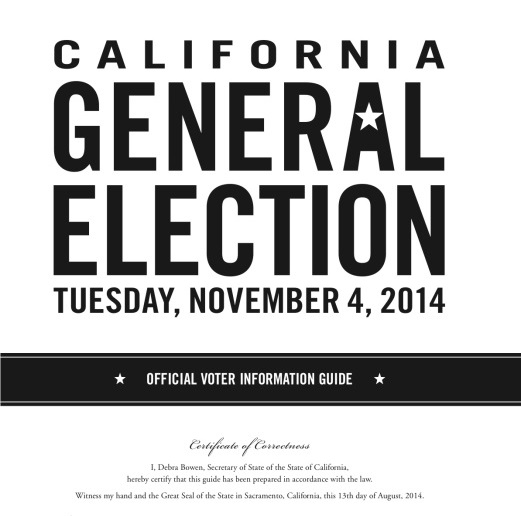
By IONA BATCHELDER
Staff Writer
California ballot propositions are proposed laws submitted to California voters for their consideration in the general election. These propositions can come directly from the state legislature or by petition signed by California citizens. Here are five of the six propositions that are on the ballot.
Prop 1: [Voted Yes] Proposal to authorize $7.12 billion for projects including public water system improvements, surface and groundwater storage, drinking water protection, water recycling and more. Supporters of the proposition include Governor Jerry Brown (D), Senator Dianne Feinstein (CA-D), Senator Barbara Boxer (CA-D) and the California Democratic and Republican Parties. The proposition is virtually unanimously supported, and there are no large organizations that oppose it. This proposition is sensible and does not have a clear organized opposition campaign.
Prop 2: [Voted Yes] Known as the “Rainy Day Budget Stabilization Fund Act.” it establishes a rainy day fund for California (a fund set aside during years of budget surplus for years of deficit). Supporters of the proposition include Governor Brown and the California Democratic and Republican Parties. Opponents of the proposition are small in number but have organized under the campaign “2 Bad for Kids,” which argues that the proposition takes needed money away from California’s education system, a claim that has been refuted by the proponents of the proposition. This proposition, like proposition 1, is strong and has the support of both major political parties and our governor. The opposition’s claim that it takes needed money away from the education system seem unfounded, especially because Dr. Michael Kirst, president of the California Board of Education, supports the proposition.
Prop 45: [Voted No] Requires changes to health insurance rates be approved by the California Insurance Commissioner before taking effect. Supporters of the proposition include Senator Feinstein, Senator Boxer and the California Democratic Party. Supporters claim that the proposition will ensure that insurance remains affordable. Opponents of the proposition, including the Californian Republican Party, have organized into a campaign called “Californians Against Higher Health Care Costs.” They argue, among other things, that the proposition puts too much power into the hands of one politician, the insurance commissioner. The insurance commissioner is an elected officer. If, with the possible help of special interests groups like insurance companies, the wrong person is elected into the spot, this proposition could be disastrous.
Prop 47: [Voted Yes] Reduces the sentence for crimes involving $950 or less from a felony to a misdemeanor. The sentence would remain a felony if the convicted person has a record of crimes such as rape, murder, child molestation or is a registered sex offender. Supporters of the proposition include Lt. Governor Gavin Newsom (D), the California Democratic Party and the former Speaker of the House, Newt Gingrich (R). Supporters argue that the proposition would reduce prison populations, therefore saving money that can be reallocated to education, among other things. Newt Gingrich also said that similar policies have been implemented in Republican states such as Texas and South Carolina, and have worked out well. Opponents of the proposition include Senator Feinstein and the California Republican Party. Opponents argue that the proposition would not make California safer, as sentences for several serious crimes like stealing firearms and identity theft would be reduced to a maximum of 12 months. Even though this proposition does have some drawbacks, such as the problem of firearm theft being counted as a misdemeanor, overall it is very well written and addresses the pertinent problem of high incarceration in America today.
Prop 48: [Voted No] Ratifies two gaming compacts between California and two Native American tribes, allowing the North Fork Tribe to build a casino on land in Central Valley. If approved, proposition 48 would exempt certain projects and intergovernmental agreements from the California Environmental Quality Act. Supporters of the proposition include Governor Brown and the California Democratic Party. Supporters argue that the passing of proposition 48 will create thousands of jobs and promote the self-sufficiency of tribes. Opponents of the proposition include Senator Feinstein and several tribal chairmen; their main argument is that this proposition could lead to more mega-casinos in local communities. Native American tribes are allowed to build casinos on their own reservation land, and there are many of them in existence. If this proposition passes, I fear that many mega-casinos similar to the one proposed will end up all over California outside of reservation land. In addition, the proposition would exempt the mega-casinos from environmental review.
Lots of the time, California propositions are not as clear-cut as voting down party lines. Voters need to conduct their own research to compare the advantages and disadvantages of each proposition and make the best decisions for themselves.














